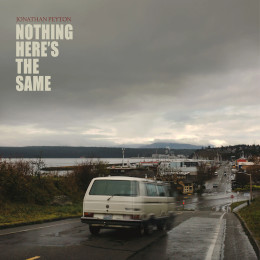
Few if any of us make it to the other side of our adolescent upbringing without a heavy amount of emotional baggage. It’s a distinct and almost inescapable part of the American experience, no matter how idyllic your upbringing attempted to be. The way innocence is protected until at some point the blindfold is removed and the raw truth of things hits us right in the face, and the way familial secrets are buried deep to present a facade of happiness to the front facing world comes with downstream consequences as we’re dumped into young adulthood.
It is these truths, and the consequences that result from them that Jonathan Peyton explores in what is his first full-length album after recently finding national buzz. Produced by Sadler Vaden of the 400 Unit, Nothing Here’s The Same is a tasty and diverse Americana-based songwriter album with inflections of country, full of expressive moments of a man confounded and confronting the demons in his head and heart.
People might remember this Georgia native from his performance in the snow in the Red Rocks parking lot before a Zach Bryan concert that almost got cancelled. Peyton later joined Zach Bryan for a rendition of “Country Roads” with Charles Wesley Godwin, resulting in a big goosing of name recognition. Peyton has also toured and opened for Wyatt Flores, Drew Holcomb, Charles Wesley Godwin, and others.
But where these other guys mix in some sunny moments with the weighty ones, Jonathan Peyton stays underwater for the entirety of the 12 tracks of Nothing Here’s The Same. The album is an example of using art to process through grief and trauma in ways that can be effective for the artist, and the audience. Peyton taps into the dark recesses of our repressed memories in a way that may feel uncomfortable for some, but ultimately is unburdening for many.

The opening song “To The Country” sets the table of clearing your head and exorcising demons, and might be the most hopeful track of the entire album. Jonathan’s wife Abigail who accompanies him on tour also sings a verse on the song, and appears via harmonies throughout Nothing Here’s The Same.
After the opening song, it’s the demons and traumas that are sung about exclusively. Even though the sentiments and songwriting are rather severe, Peyton and producer Sadler Vanden do a good job keeping the music itself entertaining and well-textured to maintain a grip on the audience. Tracks like “No Amazing Grace,” “Goin’ Crazy,” “Those Days Were Hell,” and fan favorite “Denial” come with strong senses of melody and smart instrumental selections, resulting in entertaining moments.
Towards the end of the album is where Jonathan Peyton really goes for the jugular. The story of a young girl growing up in a sternly religious household in “Sally” tugs at the heartstrings, and was wise to present as an acoustic track with a fingerpicked hook. Disillusionment with religion is kind of its own cliché in Americana songwriting and appears numerous times on the album, sometimes overlooking how religion can be its own coping mechanism, like in the song “Denial.” But its use in “Sally” really hits home.
The final song “Silence” is the ribbon that ties the whole album together. By hiding the trauma we all go through and refusing to address it, we often make things worse for ourselves. It’s songwriters like Jonathan Peyton, and albums like Nothing Here’s The Same that bravely coax those feelings out like few other exercises can. It’s cheaper than a therapy session, and often more effective.
For some, this album might be a little too heavy to be enjoyed cover to cover. Peyton can always explore more sunny moments in subsequent projects. But for now he’s processing through his own grief and allowing the audience to do the same.
With Nothing Here’s The Same, Peyton also firmly places himself in the community of country and Americana’s strong contemporary songwriters creating an alternative to the mainstream, writing songs that don’t just distract from our demons and internal dilemmas, but address them.
8.2/10
– – – – – – – –


